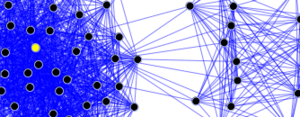 Image by Imajica Amadoro via FlickrOK--the title is way too long, but the presentation was just right.
Image by Imajica Amadoro via FlickrOK--the title is way too long, but the presentation was just right.Today: Tuesday, October 25, 2011 from 12:30-1:30 pm Ellen O'Brien, Graduate School of Education and instructor in the undergraduate Honors Program, did a brown bag presentation on using NVivo software to help students prepare to write their honors theses (or capstone projects).
Ellen described her goals and tasks for the class and the way it unfolded. Her class is a cross-section of majors on campus, but without significant experience with literature reviews, development of a thesis or in-depth research.
In this course, NVivo is an organizational tool. Identifying a topic and developing an understanding of its components included drawing or modelling a "web". These were imported into NVivo and students coded the ways that each "webbed" their ideas, leading to a rich discussion of how they used thinking tools.
Literature searches were conducted, articles identified, and uploaded into NVivo where students used the query tools to further refine their understanding of the topic. [This is a great way, I thought, to teach about the query tools using a nice, relevant little data base of your own selection.]
It was interesting to hear how engineering students brought in computer models and coded them--adding a new tool to their arsenal. It sounds like in her class she has been able to generate some cross-campus, inter-disciplinary thinking in just a few weeks.
Her talk led to thoughts about--how could NVivo be used to help undergraduates develop electronic portfolios? How can we help faculty who are not qualitative researchers, per se, to use this tool for things that are appropriate for their area? What would make it safe for them to listen and get the message?
An undergraduate was actually at the Brown Bag, one of our "Emerging Scholars" and she said that if she had learned this tool early on in her undergraduate career... "It would have made me a more rounded 21st century student." She is now learning about it in her senior year and considering developing an electronic portfolio of her undergraduate work that could help her in her bid for a doctoral program. She hopes that knowing this kind of technology will help to set her apart on her application for graduate school in the social sciences.
The next Brown Bag will be Tuesday, November 8, 12:30-1:30 pm in 513 O'Leary Library and UMass-Lowell. I will be presenting on the Sexting Project. I have a special request to think/talk about: How do you generate theory? Join us--it's fun.


